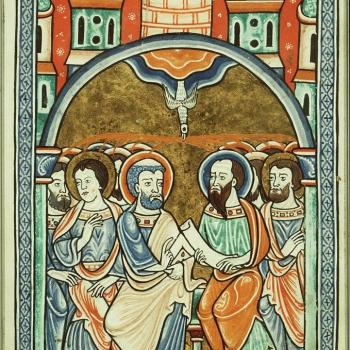This week's Gospel reading (Mark 1: 29-39) is a continuation from last Sunday's, in which Mark tells us of the first day of Jesus' teaching ministry in the Synagogue at Capernaum in Galilee at the beginning of His public ministry: Jesus had shown up to preach in their town, and all were amazed by His teaching "as one who had authority" - even the unclean spirits had to obey Him. This story takes place on the Sabbath. Later that day after sunset He worked many other miracles of healing.
This Sunday, the story continues, as Jesus goes to the home of Simon Peter and Andrew, where Simon Peter's mother-in-law was sick with a fever. He took her hands and helped her up, and she was healed and immediately took action to wait on them.
Jesus understood the importance of prayer in fulfilling His mission. "In the morning, long before dawn, He got up and left the house and went off to a lonely place and prayed there." (Mk 1: 35)
One of the questions given this week at my Bible study was, "How do you withdraw and pray?" A member of our Bible study gave a short presentation on the Daily examen of St. Ignatius of Loyola which forms part of his Spiritual Exercises. As a soldier recovering from a serious battle wound, Ignatius began reading the Bible and the lives of the Saints, and he had a profound conversion. He was moved to found the Society of Jesus - the Jesuits - who he envisioned as "contemplatives in action."
All Christians can use the examen; his exercise of "prayerful mindfulness" at the end of the day focuses us on the awareness of God's constant presence and His direction in our daily lives. If we are paying attention, God can subtly move us through ordinary experiences, seeing Him in those "aha" moments. I had never studied this, and was intrigued.
In Rummaging for God: Praying Backwards Through Your Day, Dennis Hamm, SJ gives a great word picture of the examen; He likens it to searching through a drawer to find something you know is in there. Seeking Him in the sometimes scattered clutter of busy days that seem a bit messy and confusing, we see through this discernment process how God was there in each moment, and how he was speaking to us in every situation as we pay attention.
This is a great technique for prayer and discernment of God's direction for us. There are five steps:
1. Become aware of the presence of God.
2. Review the day with gratitude. Reflect on those gifts that the past day has brought. "Rummaging through" the sometimes messy, confusing events we can find gifts to be thankful for. Reflecting back on the past 24 hours thanking God for the gifts found in our work, relationships, daily existence, and our challenges. Even our mistakes can be used by God to redirect us, and to be thankful for His guidance.
3. Review the emotions that resurface in our replay of the day. Reflecting on our feelings, both positive and negative are the clues to discernment asking God what He is saying to us through these feelings. Be real with God, and realize that feelings are morally neutral until we act on them. If we try to deny our feelings, we can miss what they have to tell us. Sometimes frustration is God's way of showing us something we need to change.
4. Choose one feature of the day, either positive or negative, and pray from it. What most stood out? Ask God to show me something He thinks is particularly important for me to notice.
5. Look toward tomorrow. Ask God to give light for tomorrow's challenges, and the actions I need to take moving forward.
End the examen with a conversation with the Lord as a friend. Ask for forgiveness, His protection and help, and His wisdom about the questions you have and the problems you face, and do it all in the spirit of gratitude.
Finally, pray the Lord's Prayer.
As a blind person, I "see" by paying attention to my other senses. Our spiritual life is much the same; the only way we "see" God's plan for us is to be attentive through prayer.
While Jesus was praying alone, Peter and the other followers found Him and told Him that everyone was looking for Him. Jesus replied, "Let us go somewhere else to the nearby villages so I can preach there also. That is why I have come." (Mk 1: 38) Jesus knew His mission. We as His followers also have our calling to fulfill. Jesus gave us the example of attentive prayerfulness to discern our path in our daily lives - to keep moving toward that goal.
2/3/2012 5:00:00 AM





